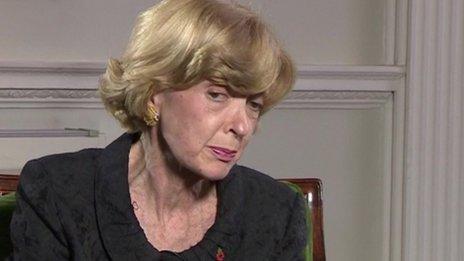Analysis: An inquiry doomed to fail?
- Published
- comments

Resigned: Fiona Woolf says she is sad she could not command confidence
Who would be the chair of a formal inquiry?
The catastrophic double-failed launch of the historical abuse inquiry raises serious questions for the Home Secretary over how she and her officials have managed this process to date - but it also demonstrates how difficult it can be to find someone capable of doing one of the toughest jobs in public life.
Right from the get-go, an inquiry chair is under massive scrutiny. They would be naive in the extreme not to realise that they run the risk of being accused of failing to get to the bottom of things or, worse, penning an official whitewash.
And that's why Fiona Woolf has quit: She realised that without the confidence of victims and survivors of abuse, the inquiry she had hoped to lead would not command the support of the very people she wanted to help.
There are a number of key criteria for selecting an inquiry chair. They need some serious intellectual and analytical skills because they may have to wade through thousands of pieces of evidence and hundreds of statements from witnesses.
While they must have the practical and intellectual abilities to manage a vast amount of information, they must also have tact, sensitivity and the ability to demonstrate absolute independence from those they are investigating.
And that's why, generally speaking, the most thorough inquiries around the world tend to be led by judges.
But the reality is that it is very difficult to find enough judges to do this work because, quite simply, there is not a ready supply of them sitting around doing nothing, waiting for the next inquiry to come along.
NAPAC's Peter Saunders: "This is not about the personal integrity of Mrs Woolf"
At present, there are four inquiries in the UK which are headed by serving or retired judges. Their colleagues are tied up doing what they are normally paid to do: sitting in court, administering justice.
That immediately narrows the pool of available talent - and, time and again, officials charged with launching inquiries can face a struggle to find the right person with the right skills who is willing to dedicate months - if not years - to a single task.
Lord Justice Leveson spent two years on the inquiry into press ethics, despite having an enormously important day job as a top judge. And if you think that's bad, don't forget the Bloody Sunday inquiry: 12 years and £200m.
Fiona Woolf's position as the second chair of the historical abuse inquiry was compromised on two grounds.
Firstly, survivors and groups representing them said that while she may have had a lawyer's analytical brain, she had no expertise in the field of investigating abuse. Secondly, she struggled to shake off the perception, that she was too much part of the establishment that the inquiry may need ultimately to probe. Her personal association with the former home secretary Lord Brittan was fatal - a man whom survivors want to question over how he handled allegations of abuse while in office in the 1980s.
Campaigners argue that all of the problems that have beset the historical abuse inquiry could have been avoided if they had been part of the process from day one.
They point to Australia's Royal Commission into Institutional Responses to Child Abuse, external which has organised itself completely differently. In that case, there was a public consultation of abuse survivors long before terms of reference and panel members were announced. Campaigners in the UK want a British public inquiry to be organised in a similar way, with respect, redress and a transparent search for the truth at its core.

Australian inquiry's terms of reference
Causes: Why does child sexual abuse occur in institutions?
Prevention: How can child sexual abuse in institutions be prevented?
Identification: How can child sexual abuse be better identified?
Institutional responses: What is best practice for institutional responses where child sexual abuse has occurred?
Government responses: What is best practice for government and statutory authorities responding to child sexual abuse?
Treatment and support needs: What are the treatment and support needs of victims/survivors and their families?
Institutions of interest: What is the history of particular institutions of interest?
Ensuring a positive impact: How do we ensure the work of the Royal Commission has a positive impact?

And this is where their most important complaint comes into the mix. Alison Miller, solicitor for many survivors of abuse, says that there is so much at stake in this inquiry that it must be backed up by full legal powers under the Inquiries Act 2005, external.
"The unanimous view from the representatives of all the groups is that there needs to be a statutory inquiry with full compulsory powers to seize documents and compel witnesses to give evidence," she says.
"If the inquiry was not headed by a high court judge then it would not be practically possible to take criminal proceedings for contempt if truthful evidence was withheld."
So who replaces Fiona Woolf? That's ultimately a question for Home Secretary Theresa May - and the BBC has learned that she has had talks with the Lord Chief Justice's office.
In her statement accepting Mrs Woolf's resignation, Mrs May said she will be meeting survivors' groups and will also consult "relevant parliamentarians". Any nomination will go before a Parliamentary Home Affairs Committee confirmation hearing.
Who does the outgoing chair think should get the job?
"I think the media has picked up how hard it is to find someone with no connections," she says in her resignation interview. "A hermit? It needs leadership - inclusive leadership - which I can't command. The victims don't have confidence in me. You need someone with confidence from everyone."